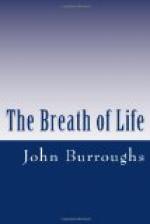II
According to the latest scientific views held on the question by such men as Professor Loeb, the appearance of life on the globe was a purely accidental circumstance. The proper elements just happened to come together at the right time in the right proportions and under the right conditions, and life was the result. It was an accident in the thermal history of the globe. Professor Loeb has lately published a volume of essays and addresses called “The Mechanistic Conception of Life,” enforcing and illustrating this view. He makes war on what he terms the metaphysical conception of a “life-principle” as the key to the problem, and urges the scientific conception of the adequacy of mechanico-chemical forces. In his view, we are only chemical mechanisms; and all our activities, mental and physical alike, are only automatic responses to the play of the blind, material forces of external nature. All forms of life, with all their wonderful adaptations, are only the chance happenings of the blind gropings and clashings of dead matter: “We eat, drink, and reproduce [and, of course, think and speculate and write books on the problems of life], not because mankind has reached an agreement that this is desirable, but because, machine-like, we are compelled to do so!”
He reaches the conclusion that all our inner subjective life is amenable to physico-chemical analysis, because many cases of simple animal instinct and will can be explained on this basis—the basis of animal tropism. Certain animals creep or fly to the light, others to the dark, because they cannot help it. This is tropism. He believes that the origin of life can be traced to the same physico-chemical activities, because, in his laboratory experiments, he has been able to dispense with the male principle, and to fertilize the eggs of certain low forms of marine life by chemical compounds alone. “The problem of the beginning and end of individual life is physico-chemically clear”—much clearer than the first beginnings of life. All individual life begins with the egg, but where did we get the egg? When chemical synthesis will give us this, the problem is solved. We can analyze the material elements of an organism, but we cannot synthesize them and produce the least spark of living matter. That all forms of life have a mechanical and chemical basis is beyond question, but when we apply our analysis to them, life evaporates, vanishes, the vital processes cease. But apply the same analysis to inert matter, and only the form is changed.
Professor Loeb’s artificially fathered embryo and starfish and sea-urchins soon die. If his chemism could only give him the mother-principle also! But it will not. The mother-principle is at the very foundations of the organic world, and defies all attempts of chemical synthesis to reproduce it.




